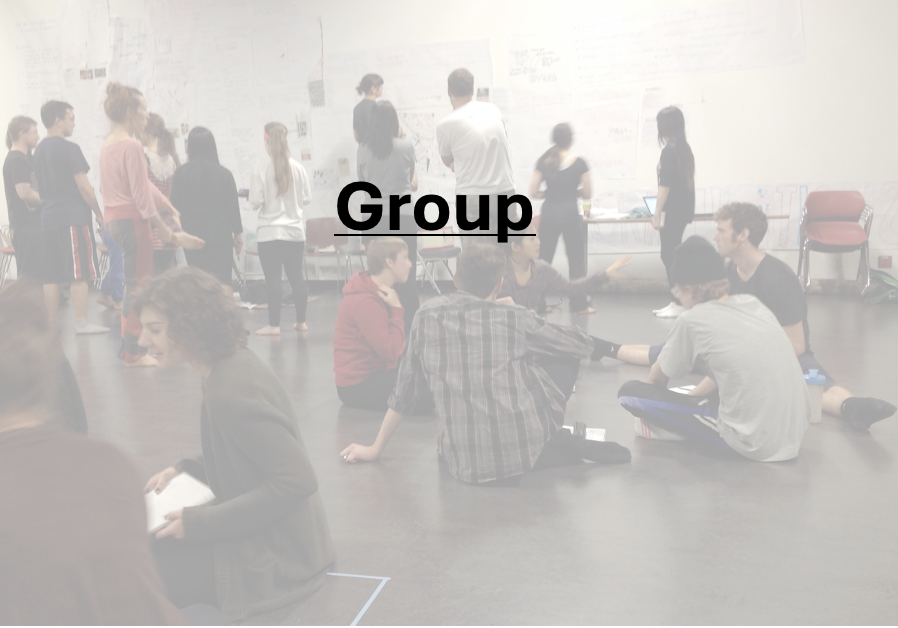Collaboration︎︎︎
Collaboration. [from
Robert Leveroos, introduced to him by Peter Balkwill at the Old Trout’s
Banff Puppet Intensive]
…all of these people are useful in a group
• Those who initiate
• Those who affirm ("yes good idea let’s do that")
• Those who provide caution ("should we consider this? What about that?")
• Those who say "I’m uncomfortable with that" -"No"
• Those who say “yes, and”
• Those who offer a counter idea
• Those who just goes along with it
• The mediator
• The practical one (ie. Stage Manager)
Questions:
Which can you identify as your default? Can you explore the roles you don't naturally fall into? If you see a role in the group that is needed -can you try that role? -other roles not listed?
A compelling reason to be on the room- ownership of the outcome.
Collaboration: (from Jonathan Burrows)
When you allow yourself to make a discovery- then there is something there for your audience to discover. When you try to agree too much with your collaborators, then there’s nothing new to discover- for you or the audience.
Talking is only one way to collaborate- talking shouldn’t become an easy escape from the frustrations which might eventually lead you somewhere
From Viewpoints:
1. Create a question to investigate that matters to everyone in the group.
2. Find an anchor that will be used to investigate the question –this could be any
method or approach.
3. Determine a structure that best holds your ideas together.
* Never shut down ideas
* Get the work out there without too much planning
* Working on your feet- instincts
* Time (work within the limits)
* Middle choices/ symmetry/ even
“Hold on tightly, let go lightly," Work in the spirit of trial and error. Be open to taking conceptual leaps of faith in order to allow for poetry and metaphor. Be open to new influences and points of view from other people. At the same time, try to stay in touch with the central question, the itch, your interest.”
…all of these people are useful in a group
• Those who initiate
• Those who affirm ("yes good idea let’s do that")
• Those who provide caution ("should we consider this? What about that?")
• Those who say "I’m uncomfortable with that" -"No"
• Those who say “yes, and”
• Those who offer a counter idea
• Those who just goes along with it
• The mediator
• The practical one (ie. Stage Manager)
Questions:
Which can you identify as your default? Can you explore the roles you don't naturally fall into? If you see a role in the group that is needed -can you try that role? -other roles not listed?
A compelling reason to be on the room- ownership of the outcome.
Collaboration: (from Jonathan Burrows)
When you allow yourself to make a discovery- then there is something there for your audience to discover. When you try to agree too much with your collaborators, then there’s nothing new to discover- for you or the audience.
Talking is only one way to collaborate- talking shouldn’t become an easy escape from the frustrations which might eventually lead you somewhere
From Viewpoints:
1. Create a question to investigate that matters to everyone in the group.
2. Find an anchor that will be used to investigate the question –this could be any
method or approach.
3. Determine a structure that best holds your ideas together.
* Never shut down ideas
* Get the work out there without too much planning
* Working on your feet- instincts
* Time (work within the limits)
* Middle choices/ symmetry/ even
“Hold on tightly, let go lightly," Work in the spirit of trial and error. Be open to taking conceptual leaps of faith in order to allow for poetry and metaphor. Be open to new influences and points of view from other people. At the same time, try to stay in touch with the central question, the itch, your interest.”
︎︎︎ from
Robert Leveroos, introduced to him by Peter Balkwill at the Old Trout’s
Banff Puppet Intensive, Johnathan Burrows and Viewpoints






